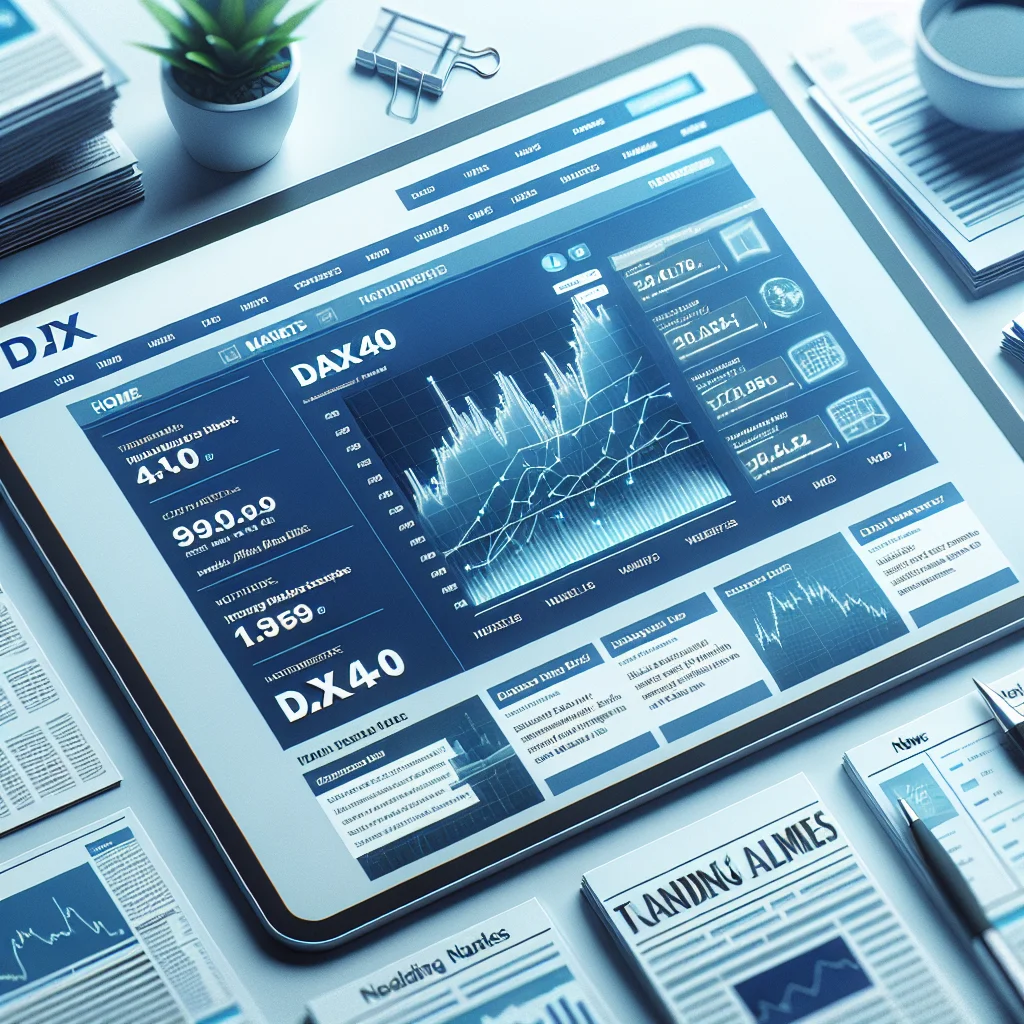Introduction
Fintechzoom.com DAX40 Today, In the dynamic world of finance, keeping abreast of major stock indices is crucial for investors, analysts, and market enthusiasts alike. One such key index is the DAX40, which represents the 40 largest and most liquid companies listed on the Frankfurt Stock Exchange. This article delves into the current state of the DAX40, offering a comprehensive yet accessible overview.
Understanding the DAX40
The DAX40, an evolution of the previously known DAX30, includes the top 40 companies in Germany by market capitalization and liquidity. This index is a benchmark for the German stock market, reflecting the health and trends of the country’s economy. The DAX40 offers a broad view of the market, providing insights into diverse sectors from industrials and consumer goods to technology and financial services.
Current Market Landscape
As of today, the DAX40 stands at a pivotal moment in the financial landscape. Here’s an in-depth look at its current status:
Market Performance
The DAX40 has been navigating through a series of market conditions, influenced by both domestic and global factors. Recent trends indicate a mix of volatility and cautious optimism. Investors are closely monitoring economic indicators, such as inflation rates, interest rates, and geopolitical events, which impact market performance.
Sector Highlights
Technology: The technology sector continues to show significant growth, with companies like SAP and Siemens leading the charge. Innovations and investments in digital transformation are key drivers.
Automotive: Germany’s automotive giants, including Volkswagen and BMW, remain central to the DAX40. Recent shifts toward electric vehicles (EVs) and sustainability are reshaping this sector.
Financial Services: Banks and financial institutions are experiencing changes due to fluctuating interest rates and evolving regulatory environments. Major players such as Deutsche Bank and Allianz are adapting their strategies accordingly.
Key Influences

Economic Indicators: Germany’s economic health, including GDP growth, employment rates, and industrial output, significantly impacts the DAX40. Recent data points suggest a mixed outlook with both growth and challenges.
Global Factors: International trade dynamics, global economic policies, and geopolitical tensions also play a crucial role. The ongoing trade relationships within the European Union and with major trading partners like the United States and China are closely watched.
Investment Insights
For investors, understanding the DAX40’s current performance is essential for making informed decisions. Here are some considerations:
Diversification
Investors often use the DAX40 to gain exposure to a diverse range of sectors within Germany’s economy. This diversification can help mitigate risks associated with any single sector or company.
Long-Term Trends
While short-term fluctuations can be notable, the DAX40’s long-term performance provides valuable insights. Historical data shows that despite periods of volatility, the index has generally trended upwards, reflecting the resilience and growth of Germany’s economy.
Research and Analysis
Staying informed about the latest news, earnings reports, and sector developments is crucial. Regular analysis of these factors can provide a clearer picture of potential investment opportunities and risks.
Case Study: Impact of Economic Policies on the DAX40
Background
In early 2023, the German government introduced a series of economic policies aimed at boosting economic growth and addressing inflation concerns. These included stimulus packages, adjustments to interest rates by the European Central Bank, and new regulations affecting key sectors like technology and automotive.
Objective

To analyze the impact of these economic policies on the performance of the DAX40, focusing on changes in market sentiment, sector-specific responses, and overall index performance.
Methodology
Data Collection: Gathered historical data on DAX40 performance from early 2023 to mid-2024, alongside relevant economic indicators such as GDP growth, inflation rates, and interest rates.
Sector Analysis: Examined sector-specific performance within the DAX40, focusing on technology, automotive, and financial services.
Market Sentiment: Assessed investor sentiment through market reports, news articles, and financial analyst commentary.
Findings
Market Performance:
The DAX40 experienced increased volatility following the implementation of the new policies. Initially, there was a sharp decline due to market uncertainty.
However, as the policies took effect and their impacts became clearer, the index showed signs of recovery. By mid-2024, the DAX40 was trading near its pre-policy levels, reflecting stabilization.
Sector-Specific Impacts:
Technology: Companies in the technology sector saw a positive impact due to increased government support for innovation and digital transformation. Stocks of companies like SAP and Infineon Technologies experienced growth.
Automotive: The automotive sector faced mixed results. While there was increased investment in electric vehicle technology, regulatory changes led to short-term challenges and adjustments.
Financial Services: Banks and financial institutions saw varying effects, with some benefiting from changes in interest rates while others faced pressure from increased regulations.
Investor Sentiment:
Investor sentiment was initially cautious but improved as the market adjusted to the new policies. Increased confidence in economic stability contributed to a more positive outlook on the DAX40.
Conclusion
The economic policies implemented in early 2023 had a complex impact on the DAX40. While there was initial volatility and sector-specific challenges, the overall market showed resilience and recovery. Investors who closely monitored these developments and adjusted their strategies accordingly were better positioned to capitalize on the opportunities presented by the evolving economic landscape.

FAQ: DAX40
1. What is the DAX40?
The DAX40 is a stock market index representing the 40 largest and most liquid companies listed on the Frankfurt Stock Exchange. It reflects the performance of major German companies across various sectors.
2. How is the DAX40 different from the DAX30?
The DAX40 is an expanded version of the DAX30. It includes 40 companies instead of 30, providing a broader view of the German stock market and including more diverse sectors.
3. What factors influence the performance of the DAX40?
The performance of the DAX40 is influenced by several factors, including economic indicators (such as GDP growth and inflation), interest rates, geopolitical events, and sector-specific developments.
4. How can investors use the DAX40 for their investment strategy?
Investors use the DAX40 to gain exposure to a diverse range of major German companies. It serves as a benchmark for the German market and helps in assessing overall market trends and sector performances.
5. What are some key companies in the DAX40?
Key companies in the DAX40 include BMW, Siemens, SAP, Volkswagen, and Deutsche Bank. These companies span various sectors such as automotive, technology, and financial services.
6. How can I track the performance of the DAX40?
The performance of the DAX40 can be tracked through financial news websites, stock market apps, and financial news channels. It is also available through major financial data providers and the Frankfurt Stock Exchange.
Conclusion
The DAX40 stands as a vital gauge of the German stock market, capturing the performance of the country’s leading companies across various sectors. Today’s market conditions reflect a blend of challenges and opportunities, influenced by both domestic and global factors. For investors and market watchers, understanding the DAX40’s current landscape is key to making informed decisions and navigating the complexities of the financial world.
As the market continues to evolve, staying updated with the latest developments and maintaining a well-rounded perspective will be essential for leveraging the opportunities the DAX40 presents.
